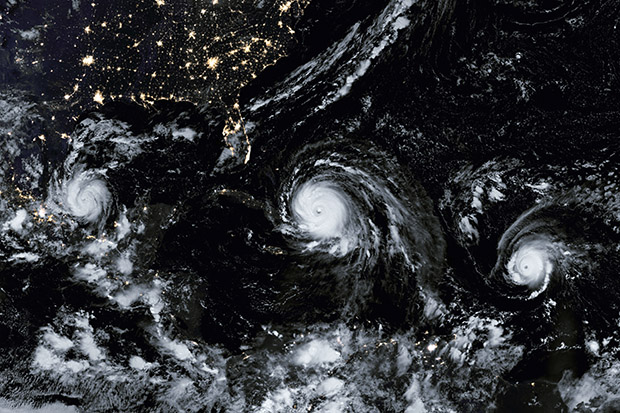
A Menacing Line of Hurricanes – Katia, Irma and Jose. Seen from the space. Elements of this image are furnished by NASA (via bigstock.com).
When most people think about climate change, they think about extreme weather patterns, global warming and rising sea levels. Many people are aware that there are also numerous ways in which climate change negatively effects people’s health, including the resurgence of many vector and water borne diseases, malnutrition and respiratory diseases. But there is another subset of climate related health effects which, while perhaps less well-known, is also extremely prevalent and destructive: the impacts of climate change on mental health. I strongly believe the fields of climate change science and advocacy would benefit from considering this facet more often.
Mental health disorders are on the rise in climate vulnerable nations. These psychological conditions are triggered most commonly by the extreme weather events and natural disasters that accompany climate change, including hurricanes, floods, droughts, wildfires and heatwaves. These phenomena often result in displacement, property damage and loss of loved ones, all of which increase stress levels for individuals and exacerbate the social, economic and environmental determinants of mental health.[1]
The mental illnesses most commonly brought on by climate trauma are stress-related disorders which result from adverse responses to severe or chronic anxiety. This broad category of mental illnesses includes post-traumatic stress disorder, panic attacks, chronic depression, insomnia, anxiety disorders, substance abuse, interpersonal violence and suicidal tendencies.[2] I find these trends especially disturbing because the people who are most susceptible to these devastating mental impacts are those who are already the most vulnerable: the poor, elderly, women, and children.
It is estimated that between 25 and 50 percent of all people who experience extreme climate events will have an adverse mental health effect.[3] Hurricane Katrina was a devastating 2008 event, and although it is not particularly unique compared to extreme weather events experienced in other parts of the world, it has been well researched due to its impact on a developed nation. According to a large survey of people living in the path of Hurricane Katrina, approximately one in every six survivors experienced PTSD and the rates of suicide more than doubled in the aftermath.[4] [5]
While Katrina has allowed for the study of long-term mental effects of climate catastrophes, Hurricanes Harvey, Irma, and Maria were three “500-year storms” that consecutively hit the United States and US territories in 2017. They have provided new opportunities for the observation of the short-term effects. In the days following the storms and floods, large portions of the affected populations experienced shock and acute stress triggered by rising flood waters, property destruction and sudden evacuations. In addition, numerous hurricane refugees who already suffered from depression, PTSD, bipolar disorder and other severe mental conditions were forced to go for days without their important medications.[6] Category 5 Hurricane Maria which plowed through Puerto Rico has proven particularly devastating to the infrastructure and the people. Since this country has not received the same quality of aid as Texas and Florida did following Harvey and Irma, I speculate that the damage to mental and physical health will be even more severe and prolonged in this country.
Although some might question why a particular focus should be placed on mental health in times of climate disaster when so much physical damage is often done. However, I can attest, as could anyone else who has suffered from a mental illness, that these conditions can be some of the most frustrating and devastating of all health concerns. In addition to the intense psychological effects of mental disorders, their subsequent physical effects are also very serious. For example, long-term stress causes the body to be overexposed to cortisol: the body’s primary stress hormone. This prolonged exposure hinders the body’s glycemic control capabilities and can be extremely dangerous, especially for individuals with type II diabetes. This long-term stress exposure disrupts other natural processes as well and is correlated to increased incidence of heart disease and cancers.
Although it has not always been widely acknowledged, I am thankful that the rise of mental disorders is quickly becoming recognized as an important effect of climate change. In countries like the United States and Australia, there has even been a considerable amount of research done on this issue in the last decade. However, I think there should be more mainstream discussion about the unique relationship between climate change and mental health in vulnerable, developing nations around the world. Additionally, further studies on the broad range of health effects of climate change should always include an evaluation of mental health effects since mental health is inextricably linked to many physical health problems. Raising awareness and increasing understanding is the first step towards combating climate change related mental health issues. Lastly, I hope that mental health services will become a priority of emergency response services going forward so as to best protect and serve climate disaster survivors.
Haley Stepp is an intern with the CWS advocacy team.
[1] http://www.wpro.who.int/mediacentre/releases/2016/20160426/en/
[2] https://thinkprogress.org/the-hidden-mental-health-impacts-of-climate-change-9a2e7dd09745/
[3] http://www.ucsusa.org/global_warming/science_and_impacts/impacts/climate-change-and-mental-health.html
[4] https://www.apha.org/~/media/files/pdf/topics/climate/climate_changes_mental_health.ashx
[5] http://www.apa.org/news/press/releases/2017/03/mental-health-climate.pdf
[6] http://www.npr.org/sections/health-shots/2017/08/29/547027763/health-issues-stack-up-in-houston-as-harvey-evacuees-seek-shelter
